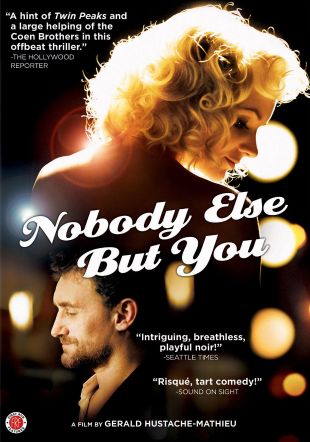Gerald Hustache-Mathieu's Nobody Else but You has been typed in some quarters as a French neo-noir thriller, but that cursory description fails to strike at the heart of the movie's pleasures. It's better described as a sad-eyed drama with blackly comic overtones, and that's the level on which it works most effectively.
Jean-Paul Rouve stars as David Rousseau, a best-selling French crime novelist suffering from a massive case of writer's block, which puts him in danger of losing a contract with his exasperated publisher. When a relative dies, David must drive 400 miles to attend the reading of the will, and winds up in the snowbound village of Mouthe, a kind of subthermal no-man's-land near the French-Swiss border. This coincides with the apparent suicide of Candice Lecoeur (Sophie Quinton), a beautiful young woman who attained celebrity as the cover girl and salacious television model for a local line of French cheeses. Sensing that there may be foul play behind Candice's death -- as well as a story for his next novel -- David checks into a motel and begins to nose around the community, systematically unearthing information about Candice's past. As this happens, events from her life play out before our eyes in flashback.
As far as suspense is concerned, the movie has almost none. Because Candice dies at the outset, no tension exists onscreen. That isn't necessarily a flaw, however, because what we get in place of tautness is a satisfying poignancy. This is a heartbreaking story: the tale of a sweet and initially unassuming female auto mechanic from a French village who happened to be in the right place at the right time and crossed paths with an opportunistic photographer seeking a sexy model for his next calendar. One thing led to another, and this small-town girl fell in way over her head. That may be a well-trod narrative -- it evokes dozens of real-life stories that also ended tragically, from Dorothy Stratten to Shauna Grant, and fictional predecessors, notably the corruption of Laura Palmer in Twin Peaks -- but however familiar the theme may be, it delivers emotionally here.
Hustache-Mathieu also achieves originality by offsetting some of the pathos with flashes of wicked, slightly misanthropic humor, typically in throwaway bits such as a hilarious sequence involving a dowdy, heavyset old woman in a hair salon who gets a permanent but complains that her visage doesn't resemble the sexy young model "in the picture" -- and is promptly reassured that it is simply attributable to the lack of studio lighting in the beauty shop. This is only one of numerous examples, and they give the movie a freshness and buoyancy that it would otherwise lack, in addition to making David's framing story nearly as enjoyable as the central one involving Candice.
What doesn't work as well in the film is the heavy-handedness with which Hustache-Mathieu ties Candice's story to the Marilyn Monroe legend -- a parallel so forced and so over-the-top that we even get a cringe-worthy sequence in which Candice reenacts the famous "Happy Birthday, Mr. President" JFK incident. It isn't necessarily an unworkable idea to build Monroe parallels in the film, but if they exist, they either need to be subtle and unstated (as in a brilliant scene in which the director has Quinton ape the poses and background of Monroe's 1953 Playboy nude pictorial) or Hustache-Mathieu needs to work harder and more carefully to establish his implication that Lecoeur had a self-fulfilling, pathological need to pattern her life after the Monroe tragedy and iconography. As they stand, the Monroe elements seem gratuitous, tacky, and pointless.
Still, the movie is consistently entertaining and never boring for a second. It's clear throughout that Hustache-Mathieu loves eccentric characters and that he takes great pleasure in the art of cinematic storytelling. The delightfulness of the journey taken by the film is a testament to the co-writer/director's skill in both arenas.
